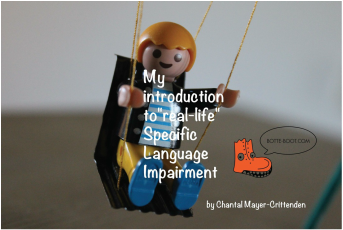|
Thank you for reading my first post published on March 21st 2015. I have gotten some very positive feedback and I thank you for that. The goal of this post is to write about the struggles my husband and I faced as parents when trying to determine the source of our daughter's difficulties in school, how we overcame those struggles and to share some resources that helped explain what we were going through. Diagnosing a child with specific language impairment (SLI) can be quite challenging, especially in a bilingual setting. However, before stepping into the world of bilingualism, I thought I should explain the nature of SLI as well as share with you my personal journey through the diagnostic process. What is SLI? Well, simply put, SLI is a deficit in language ability that cannot be attributed to problems of hearing, neurological status, nonverbal intelligence, or other known factors (Leonard, 2014), and is found in approximately 7% of the population. Children have difficulties producing language or understanding language, or both, in it's oral and written forms. It is just as common as ADHD and dyslexia and more common than autism, yet very few people know about it due to it's often silent symptoms. In an effort to inform the larger public, Bishop and collaborators (2012) launched an internet campaign for raising awareness of language learning impairments (RALLI). This can be found on YouTube, and is very informative for researchers, parents and teachers as well as children who have SLI. I have included one of the many YouTube videos in this post. I will post on SLI more specifically in the near future so stay tuned. My first "real-life" introduction to SLI was with my daughter. I had worked with a child who had SLI, as a clinician, but didn't actually "live" it for myself. My daughter is the middle child of three children, 9, 7 and 5. Needless to say, the first 4 years of her life were very busy, with a brother who is 22 months older and a sister, only 20 months younger. It wasn't until junior kindergarten, when she was 4 years of age, that I suspected she was having difficulties learning language. Coming from an experienced speech-language pathologist, this is a little bit embarrassing. I often asked myself "how could I have missed this?". Come to think of it, her early years are a bit of a blur, mostly due to major sleep deprivation as young parents! Her difficulties were not as obvious as I would have expected of a child with SLI. But then again, she is the middle child... maybe I didn't pay enough attention. She was screened by her school board speech and language pathologist with some mild concerns but nothing that merited a full assessment. Nevertheless, she was coming home on a weekly basis with notes relating to her learning. These notes would often frustrate my husband and I because they seemed to become more and more negative and sent the message that her teacher was becoming increasingly frustrated with our daughter as time went by. Even though we both knew that was not the intent. Her teacher had taught our son and so we knew her quite well. She was a fabulous teacher. My daughter had a difficult time learning the sounds of the letters, couldn't follow complex directions, she sometimes lacked initiative and wrote her name wrong for months, even years! Sometimes perfectly backwards, like the word ECNALUBMA on an EMS vehicle. However, she had great friends (most were friends she had made in daycare since the age of 18 months) and was happy to go to school, so it didn't seem so bad. In fact, she has always been a very happy, go lucky child. That's what makes her shine! In the summer after junior kindergarten, she participated in my doctoral study pertaining to the linguistic competencies of bilingual children. She was supposed to be one of the typically developing children...so I thought. She was formally assessed by my colleague. After assessing over 100 kids in both French and English, her scores were compared to the mean scores obtained from all the other children.... she scored below 1.5 standard deviations from the mean (below average) on several subtests. This, along with the past year's struggles and teacher observations made it clear to me that my daughter had a language impairment. Senior kindergarten was very much the same as junior kindergarten. This is when we initiated the referral to have her assessed by a psychometrist, in order to determine whether or not she had a learning disability. But the wait list we were told was 2 years long. Luckily, a good friend of mine is an occupational therapist, so I asked her if she could assess her fine-motor skills to see if there could be an underlying cause to her written language difficulties. My friend recommended that she be seen by an optometrist who specializes in visual-perceptual deficits. Low and behold, she was diagnosed with a visual-perceptual disorder. So we had some activities to do at home to help her with that. This also partly explained her clumsiness, which is now just part of who she is and is in fact, quite common in children who have SLI. By this time, she had been seen by two optometrists who both recommended she wear glasses as she was far sighted just like her father. Unfortunately, she refused to wear her glasses, so that just became another daily battle. My daughter was still struggling with her letters, sounds and now numbers. But we persevered by providing her with extra help. We also suspected she might have ADD, since it was in the family. She had a move and sit cushion in class (a cushion that allows a child to move around on their seat without disrupting others), which seemed very helpful when she felt fidgety. She still uses it today! She was followed by a pediatrician but a formal diagnosis could not be made until the age of 6-years. Her teachers and I completed the Vanderbilt ADHD questionnaire and it was clear from the results that she had ADD. It wasn't until 3/4 of the way through first grade that she received a formal diagnosis from her pediatrician. I will talk about this topic of dual diagnosis in another post since I just can't fit it all into this one!!! My daughter was assessed by a psychometrist at the end of first grade (luckily we didn't have to wait two years after all) and the results showed some weaknesses in working memory and math, but no learning disability per say. This confirmed, once again, the diagnosis of SLI. All in all we are lucky. I knew enough to seek help from various sources and at a young age. After consulting 5 or 6 professionals, this lead to an appropriate diagnosis which helped explain why she was having such difficulties in school. It also resulted in the implementation of a formal Individual Education Plan (IEP) as well as some of the best collaborative efforts I've ever seen between teachers, speech-language pathologists, doctors, child and parents. My daughter is now in grade 2. She loves going to school and amazes us all the time. Her teacher ofter says that our daughter offers a different perspective on things. She sees things from a different angle, which adds richness to class discussions! This experience has, undoubtedly, shaped me, both as a mom, and as a researcher. I am a true believer in the proverb "It takes a whole village to raise a child!". I have learned so much since then, and I look forward to sharing with you what I know now but wish I knew then, as well as some of the best resources I have come across. Thanks for reading! My next post will be on April 13th, 2015: Bilingualism and SLI: A walk in the park? Chantal Mayer-Crittenden, 2015.
Lisa Nowak
3/28/2015 03:06:37 am
Great read Chantal! I love your second blog about SLI - your story hits home with me because I see many students come through my class who struggle with learning and this information gave me something to think about...as far as I know, there has never been an SLI diagnosis in our board. Maybe the professionals don't know what to look for since there are so many silent symptoms? Comments are closed.
|
|


 RSS Feed
RSS Feed